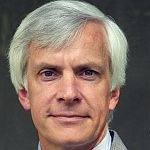 (HOST) Recently commentator and Vermont Humanities Council executive director Peter Gilbert picked up the autobiography of Albert Schweitzer. He was struck by how Schweitzer’s concerns about the lack of thought or reason in society – are as timely today as they were when he wrote them 80 years ago.
(HOST) Recently commentator and Vermont Humanities Council executive director Peter Gilbert picked up the autobiography of Albert Schweitzer. He was struck by how Schweitzer’s concerns about the lack of thought or reason in society – are as timely today as they were when he wrote them 80 years ago.
(GILBERT) Born in what was then the Alsace region of Germany in 1875, Albert Schweitzer was a Christian theologian, philosopher, organist devoted to the study of music by Bach, and physician who worked in West Africa in the early twentieth century. He won the Nobel Peace Prize in 1952 for his altruism, "reverence for life," and commitment to world brotherhood.
In his 1931 autobiography, Out of My Life and Thought, Schweitzer wrote that he was "in complete disagreement with the spirit of [his] age because it [was] filled with contempt for thought." A man of deep faith, he was nonetheless concerned about both the neglect of thought and society’s mistrust of it. "The organized political, social, and religious associations of our time are at work convincing the individual not to develop his convictions through his own thinking but to assimilate the ideas they present to him. Any man who thinks for himself," he wrote, "is to them inconvenient and even ominous."
Schweitzer argued that society tries "to rob [modern man] of all confidence in his own thinking. He lives in an atmosphere of intellectual dependence. . . . [He’s] forced into skepticism about his own thinking, so that he may become receptive to what he receives from authority." People soon conclude that they are not qualified to come to their own conclusions.
Schweitzer wrote that when we lose confidence in both our ability to think and the potential to arrive at the truth through thinking, then general skepticism develops. He asserted that those who promote such skepticism in order to confuse and control the populous believe that in time "men will come to accept as true whatever is forced upon them by authority and by propaganda."
But Schweitzer believed they are mistaken. "Whoever opens the sluices to let a flood of skepticism pour over the land," he wrote, "cannot assume that later he can stem the flood. Only a few of those who give up the search for truth will be so docile as to submit once and for all to official doctrine. The mass of people will… lose all desire for truth, finding themselves quite comfortable in a life without thought, driven… from one opinion to another."
I expect that Schweitzer is right that promoters of general skepticism can’t necessarily control the beast they unleash, whether they are, as he said, organized political, social, religious – or I would add commercial associations. They can’t necessarily control for long what the masses think. But that is of little comfort; after all, if skepticism is rampant, then the mass of people live without thought, leaping from opinion to opinion when or a more compelling sales pitch or a more attractive advocate comes along. That’s hardly an attractive vision for any society. A healthy democracy requires that all its citizens – regardless of their opinions and beliefs – keep their brains attached.